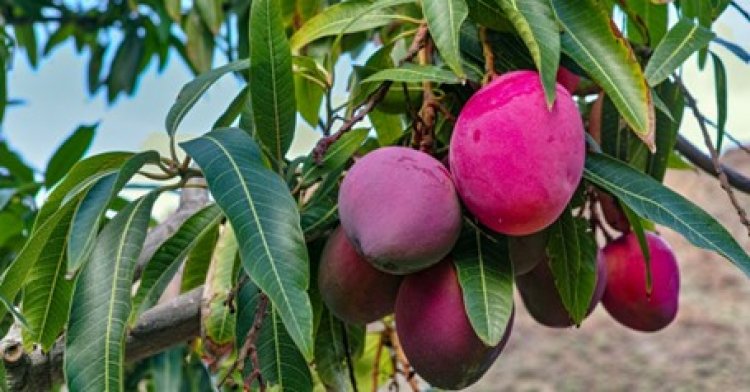Mango, the growing health benefits of the ‘King of Fruits’
Eating mangoes can help strengthen your gut, relieve you of constipation and provide a range of vitamins to improve your overall immunity. So, this summer, don’t lose a chance to go for the luscious fruit whose taste will only make you want more and more.

Eating mangoes can help strengthen your gut, relieve you of constipation and provide a range of vitamins to improve your overall immunity. So, this summer, don’t lose a chance to go for the luscious fruit whose taste will only make you want more and more.
Researchers at the University of Hyderabad (UoH) have demonstrated that mangiferin, an active ingredient in mangoes, protects animals from experimentally induced colitis, a form of Inflammatory Bowel Disease (IBD). It also contains a combination of polyphenols and fiber, which have shown to improve Gut Health and in relieving constipation. Mangiferin, a xanthone C-glucoside, found in several plant species including mangoes, is well known for its pharmacological properties.
In India a wide variety of mangoes are grown across different states. In addition to their fruity flavour, mangoes contain several key nutrients such as Vitamin A, Vitamin B6 and Vitamin C, which may help in boosting the body's natural immune system, the UoH researchers say. However, further pre-clinical and clinical studies are required to develop mangiferin as a clinical candidate for treatment of IBD and other GI disorders.
The results of the study have been published by Dr. Gangadhar, Dr. Suresh Kalangi and Dr. Anil Kotha from the lab of Prof. Reddanna, School of Life Sciences, University of Hyderabad, in the journal of “American Chemical Society Pharmacology and Translational Science” (https://pubs.acs.org/doi/epdf/10.1021/acsptsci.3c00323).
Meanwhile, another US study showed that for those suffering from constipation grabbing a mango instead of reaching for a fiber supplement, could be more beneficial. The pilot study by Texas A&M University was published in the peer-reviewed journal Molecular Nutrition and Food Research way back in 2018. The researchers found that mango, which contains a combination of polyphenols and fiber, was more effective than an equivalent amount of fiber powder in relieving constipation - a chronic digestive condition that affects an estimated 20 percent of Americans.
Fiber can also help people feel full longer, which can prevent overeating and help with weight loss. That, in turn, leads to a healthy body weight, which decreases the risk for diabetes, cancer and heart disease, researchers say. The fruit has no cholesterol and virtually no fat. It contains calcium, iron, copper, magnesium, potassium, folate and lycopene and provides 67% of the recommended daily value of Vitamin C, which the body cannot make.
According to the US Department of Agriculture, one cup of mango cut into pieces contains:
99 calories
1.3 grams of protein
25 grams of carbohydrates
2.6 grams of fiber
22 grams of sugar
Researchers have shown that in animals mangiferin prevented mucosal erosion and infiltration of inflammatory cells, which were induced by acetic acid. It also demonstrated anticancer effects of mangiferin on colon cancer. Mangiferin is found in higher concentration in the leaves, and peels than in the pulp in various types of mangoes. A number of scientific studies have shown its antioxidant, anti-inflammatory and anti-cancer properties. Further, mango consumption is positively associated with lowering risk of heart problems through a reduction in lipid levels and inflammation. The UoH study assumes importance in the light of increasing cases of IBD, which is a chronic inflammation of the gastrointestinal tract. The incidence has almost doubled in India from 1990 to 2019, with a rising death rate; as a result of changes in dietary habits and lifestyle.
According to doctors, the prolonged IBD condition, if not treated, may result in the damage of the GI tract and lead to cancers. In the era of junk food and battling infectious diseases, Indian traditional mangoes turn out to be a wonderful remedy for most of the gastrointestinal problems, including IBD.
The slogan could be “Eat Mangoes for Gut Health”, the UoH researchers said.
Traditional Use & History:
Mangoes, scientifically known as Mangifera Indica belonging to the Anacardiaceous family, originated over 5,000 years ago in the Indo-Burma region, which extends from eastern India and southern China across Southeast Asia. Mango is inextricably connected with folklore and religious ceremonies. One of the most well-known traditional uses of Mango leaves in India is to use them as a decorative door hanging which is known as a Torana (gateway in Sanskrit).
Associated with Hindu deities, it is believed that the leaves are an embodiment of God, and keeping them at the entrance will bring good luck and prosperity to the house. People also string them up in religious ceremonies and during weddings as a blessing of prosperity and fertility.
Scientifically, mango leaves become sturdy when mature, which allows them to last for several days. Therefore, the dark green colour allows the leaves to purify the air by absorbing carbon dioxide and releasing oxygen. The leaves have been active ingredients in Indian Ayurvedic medicine.
(M Somasekhar is an independent journalist who specializes in Science & Technology, Agriculture, Business and start-ups based out of Hyderabad)


































